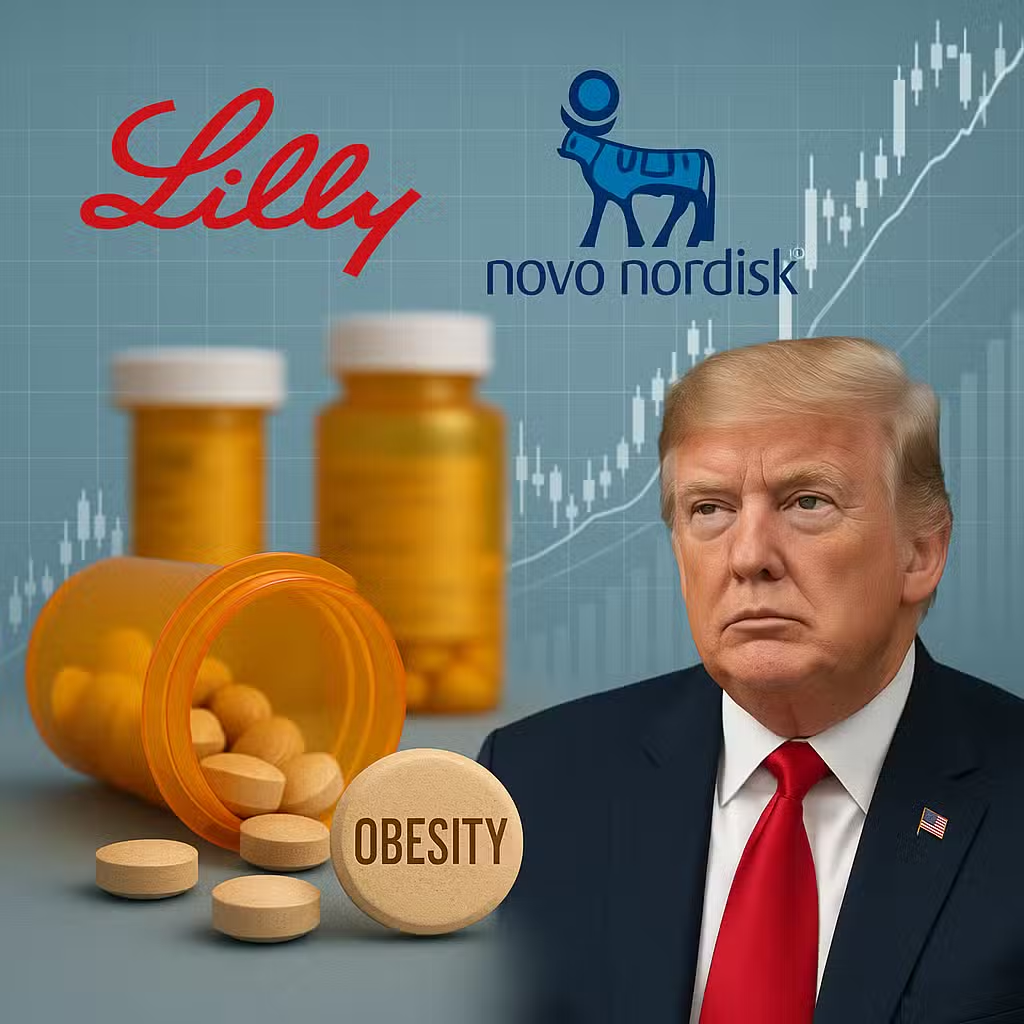Lilly, Novo Nordisk Partnerships with Trump May Expand Obesity Drug Market for Investors
Imagine if getting healthy medicine was like getting a ticket to a theme park—some people get in easily, but others have to wait outside because tickets are too expensive. That’s what’s been happening with new obesity drugs, but big changes are coming that could open the gates for millions more people.
What’s Happening With Obesity Drug Coverage?
President Trump just made a deal with two big drug companies, Eli Lilly and Novo Nordisk. These companies make popular obesity drugs called GLP-1s, like Zepbound and Wegovy. Right now, these drugs are expensive—over $1,000 a month for many people—and most insurance plans don’t help pay for them.
The new deals mean Medicare, which is government health insurance for people over 65, will start helping certain patients pay for these obesity medicines in 2026. The drug companies also agreed to lower their prices for Medicaid, which is health insurance for people with low incomes. There will also be discounts for anyone who buys directly through a new government website called TrumpRx.gov.
Why Investors Should Care
This matters for investors because it could shake up the health care and drug sectors. If more people can get these medicines, drug companies could sell a lot more, but they might also make less money on each sale because of the lower prices.
According to Eli Lilly’s CEO, about 8 to 9 million people in the U.S. already use GLP-1 drugs. With Medicare’s new rules, up to 40 million more people could qualify to get them. That’s a huge jump and could change how much money these companies make—and how much their stock is worth.
For context, a recent KFF report found only about a dozen states’ Medicaid programs currently cover these obesity drugs. But that could change with these new deals.
Bull Case: Why This Is Good News
- More Access: Millions of older adults and low-income families could now afford these medicines.
- Health Benefits: People who need help losing weight could see big health improvements, lowering the risk for diabetes and heart disease.
- Market Growth: Drug companies might sell a lot more product, even if the price per dose is lower.
- Peer Pressure: Once Medicare covers something, private insurance companies often follow. That means even more people could get coverage soon.
Bear Case: Why There Are Risks
- Lower Profits Per Dose: Drugmakers are cutting prices, which could hurt their profits even if they sell more.
- Rules and Limits: Not everyone will qualify—only certain Medicare patients with high body mass index (BMI) and other health problems can get the drugs at first.
- State Budgets: Medicaid programs already have tight budgets. Covering these drugs could mean tough choices or even higher taxes in some states.
- Legal Hurdles: There’s a law against Medicare covering weight loss drugs, so some of these changes are temporary until Congress acts.
What’s the Catch?
Medicare will only cover these drugs for people who meet certain health conditions, like a BMI over 27 with other health issues, or a BMI over 30 with related conditions. Even so, experts say up to 80% of Medicare patients with obesity could qualify under the new rules.
Private insurance is still behind—just 36% of big companies cover these drugs for both weight loss and diabetes, according to a 2024 survey from the International Foundation of Employee Benefit Plans.
For people without good insurance, the direct-to-consumer discounts could still be a game-changer. Prices could drop from $450 to $250 a month on TrumpRx.gov, making the drugs more affordable for many.
Investor Takeaway
- Watch for changes in Eli Lilly and Novo Nordisk’s stock—they could see more sales, but at lower prices.
- Keep an eye on insurance companies and health care funds; this could shift how they cover obesity and diabetes care.
- If you invest in state or city bonds, watch for news about Medicaid budgets and possible tax changes.
- Check out companies that support telemedicine or direct-to-consumer health—more people might shop for medicine online.
- Stay tuned for updates from Congress—permanent Medicare coverage for weight loss drugs could spark another big market move.
For the full original report, see CNBC







